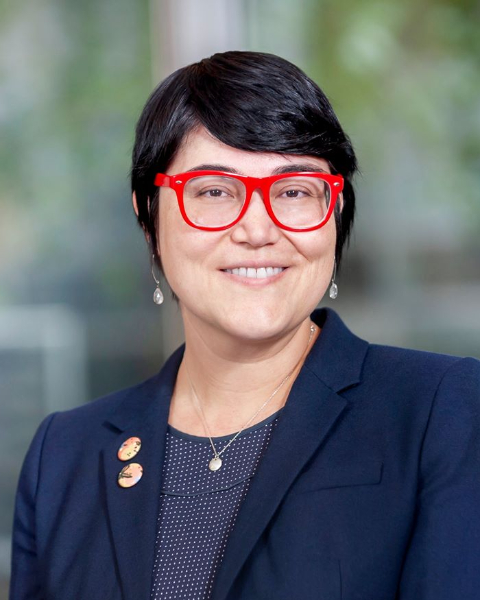SS 39 - HSR 1: Moving Beyond the Beam: Health Services Research in Policy, Practice, and Payment?
326 - Medical Misinformation about Cancer Recurrence Risks in Patients with Breast Cancer Who Received Radiation
Tuesday, October 1, 2024
5:45 PM - 5:55 PM ET
Location: Room 144

Fumiko Chino, MD
MD Anderson Cancer Center
Houston, TX, United States
Presenter(s)
F. Chino1, J. P. Chino2, S. Meske3, and M. Weiss3,4; 1Department of Radiation Oncology, Memorial Sloan Kettering Cancer Center, New York, NY, 2Department of Radiation Oncology, Duke University Medical Center, Durham, NC, 3BreastCancer.org, Ardmore, PA, 4Lankenau Medical Center, Wynnewood, PA
Purpose/Objective(s): Medical misinformation has proliferated in the past decade and may influence patient-provider trust and communication. It is unknown how common misinformation is in patients who received radiation for breast cancer. Materials/
Methods: Between 7/2023-8/2023, active patients and survivors were recruited from Breastcancer.org and consented to participate in a national, anonymous online survey in English or Spanish. Eligibility included: US resident, age =18, and diagnosed with breast cancer within the past 10 years. Survey assessed specific factors that patients had heard either INCREASE or DECREASE risk of cancer recurrence or progression. Multivariate analysis (MVA) assessed exposure to medical information after controlling for age, marital status, race, ethnicity, and education.
Results: Of 997 who completed the survey, 732 (73.4%) had received radiation. Of this cohort, 98.3% identified as women, 85.7% White, 5.3% Black, and 3.6% Hispanic. Median age was 62.5 (interquartile range IQR 53-69). 76.8% had at least a college degree. Most survey participants (61.5%) had heard that sugar was associated with INCREASED RISK of cancer recurrence or progression. Patients also endorsed hearing about how deodorant (22.1%), vaccines (7.9%), cell phones (7.9%), and bra type (7.8%) could increase cancer recurrence risk. Overall, 65.4% had heard some piece of misinformation about what may increase risk of cancer recurrence. When asked about factors associated with DECREASED RISK of cancer recurrence or progressions, 40.2% survey participants reported hearing that eating organic food could decrease risk. Additional factors patients had heard could reduce risk included: oral vitamins/supplements (27.2%), alkaline diet/alkalized water (13.0%), vitamin infusions (6.3%), cleanses/colonics (5.1%), essential oils (4.9%), and oxygen treatment (4.0%). Overall, 52.7% had heard some piece of misinformation about what may decrease risk of cancer recurrence. Most (75.8%) participants had heard at least some piece of medical misinformation about cancer risk. On univariate analysis, Hispanic ethnicity (OR 8.05 95%CI 1.08-59.9, p=0.042) was associated with having heard misinformation. On MVA however this association with Hispanic ethnicity (OR 7.52 95%CI 1.00-56.40, p=0.05) did not reach significance threshold of p<0.05.
Conclusion: This national survey of breast cancer survivors treated with radiation finds that medical misinformation about cancer risk is very common, with over 75% of patients reporting having heard at least one piece of misinformation. As misinformation can negatively impact cancer outcomes including survival, understanding how to best address the spread of misinformation and improve patient education is key.
Purpose/Objective(s): Medical misinformation has proliferated in the past decade and may influence patient-provider trust and communication. It is unknown how common misinformation is in patients who received radiation for breast cancer. Materials/
Methods: Between 7/2023-8/2023, active patients and survivors were recruited from Breastcancer.org and consented to participate in a national, anonymous online survey in English or Spanish. Eligibility included: US resident, age =18, and diagnosed with breast cancer within the past 10 years. Survey assessed specific factors that patients had heard either INCREASE or DECREASE risk of cancer recurrence or progression. Multivariate analysis (MVA) assessed exposure to medical information after controlling for age, marital status, race, ethnicity, and education.
Results: Of 997 who completed the survey, 732 (73.4%) had received radiation. Of this cohort, 98.3% identified as women, 85.7% White, 5.3% Black, and 3.6% Hispanic. Median age was 62.5 (interquartile range IQR 53-69). 76.8% had at least a college degree. Most survey participants (61.5%) had heard that sugar was associated with INCREASED RISK of cancer recurrence or progression. Patients also endorsed hearing about how deodorant (22.1%), vaccines (7.9%), cell phones (7.9%), and bra type (7.8%) could increase cancer recurrence risk. Overall, 65.4% had heard some piece of misinformation about what may increase risk of cancer recurrence. When asked about factors associated with DECREASED RISK of cancer recurrence or progressions, 40.2% survey participants reported hearing that eating organic food could decrease risk. Additional factors patients had heard could reduce risk included: oral vitamins/supplements (27.2%), alkaline diet/alkalized water (13.0%), vitamin infusions (6.3%), cleanses/colonics (5.1%), essential oils (4.9%), and oxygen treatment (4.0%). Overall, 52.7% had heard some piece of misinformation about what may decrease risk of cancer recurrence. Most (75.8%) participants had heard at least some piece of medical misinformation about cancer risk. On univariate analysis, Hispanic ethnicity (OR 8.05 95%CI 1.08-59.9, p=0.042) was associated with having heard misinformation. On MVA however this association with Hispanic ethnicity (OR 7.52 95%CI 1.00-56.40, p=0.05) did not reach significance threshold of p<0.05.
Conclusion: This national survey of breast cancer survivors treated with radiation finds that medical misinformation about cancer risk is very common, with over 75% of patients reporting having heard at least one piece of misinformation. As misinformation can negatively impact cancer outcomes including survival, understanding how to best address the spread of misinformation and improve patient education is key.
